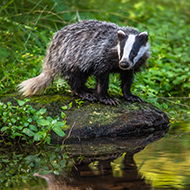BVA welcomes new study on badger culling

"We welcome any new data or research that sheds light on bovine TB control" - James Russell, BVA.
The British Veterinary Association (BVA) has welcomed the publication of a new study exploring the role of badger culling in reducing bovine tuberculosis (bTB) in England.
Published in Vet Record, the paper uses a variety of statistical approaches to compare herd incidence and prevalence data from within and outside high-risk badger culling areas. It also compares the change in incidence across ten county areas for the period 2010–2020.
Researchers found that a decline in incidence and prevalence of bTB could be linked to the introduction of cattle-based disease control measures in that same time period. However, the paper acknowledges the limitations of the data used for this analysis.
Responding to the findings, BVA senior vice president James Russell said: “As an evidence-based profession, we welcome any new data or research that sheds light on bovine TB control.
“Our own policy position recognises the need for ongoing analysis in what is a scientifically complex field and supports a holistic approach that makes use of all the tools in the toolbox to tackle this devastating chronic disease.”
"As the paper clearly acknowledges, there are limitations to the data used by the authors. We are also aware that Defra’s analysis of the research offers a different perspective. We will be reviewing the new research in order to draw our own conclusions on the robustness of the analysis and any implications for our policy."
Mr Russell adds: "As with all our policy decisions, BVA will take this opportunity to review and consider all new and emerging research to ensure our recommendations reflect the latest, scientifically rigorous evidence.”
BVA’s policy on bovine TB control and eradication, which includes controls in cattle, building on the strong vet-farmer relationship, and rewarding farmers for good biosecurity, is available at bva.co.uk



 The latest
The latest